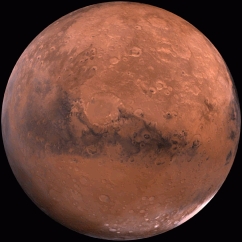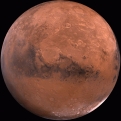home - rants - 2013 - may - mars one earth one part two
Mars One, Earth One - Part Two (of Two)
16 May 2013
by ZigzagtoesA project to get a permanent human settlement on Mars is underway, with thousands of applicants hoping to be the chosen few, to never step foot back on Earth.
In this second part (read part one here), should the landing be real, I take a look at a possible revolution.
Let's face it; most applicants don't want to be here on Earth. When I come to think of this mission, in
the long term, I can see that it may not go to plan for the TV producers.
Imagine you was one of the crew; would you really want to be filmed for Earth's entertainment, 24-7, for
the rest of your remaining life? Even dying on camera? I very much doubt it.
Every couple of years, another crew of people arrive from Earth, to join the colony on Mars. If heads are
used within the full colony, an agenda could be made, to become a whole new civilisation detached from Earth control.
All that has to be done is a lot of waiting and planning for the colony to be self sufficient.
Food production is priority, ideally you would need to have production of food, around 50 percent above
needs encase of a bad batch, and excess can be stored. If excess spoils, it can be recycled (compost).
Red is dull, green is nice. Concrete jungles everyone hates, hence why people have gardens and spend time in
parks, to feel relaxed. We are going to need a garden. The fastest and most useful of all plants is hemp. No laws
on Mars, so shipping hemp there will be ideal. Plus it has a very fast growth rate on earth of just a few weeks.
The priority items of tech, other than those to sustain life, must include 3D printers, adapted to use hemp as its ink.
Essentially, get everything you need shipped to Mars, before breaking away from Earths dependence.
Once independence is achieved, break the constant big brother communications to Earth, and only allow feeds
agreed within the colony.
On Mars, monetary values are nil, everything is shared for the benefit of progress. Trading with Earth, however,
may still be required. Whatever is needed from Earth, can be traded with scientific research carried out on Mars,
under a constant camera feed from the laboratory area.
It may seem too far out there, as a probable outcome, yet probable is possible. Think of Mars, as Earth One, or
Earth v1.0
Mars had a thicker atmosphere, had running water, and other elements of the ingredients of life, have recently
been discovered.
It is entirely possible that we occupied Mars in our distant past, before we destroyed it, or a catastrophe
occurred, forcing us to flee to a new home, our current Earth.
For me, I see a manned mission, and exploration of Mars, as something that must be done, to see if there's any
indication of a past humanoid civilisation (cave drawings and the like).

